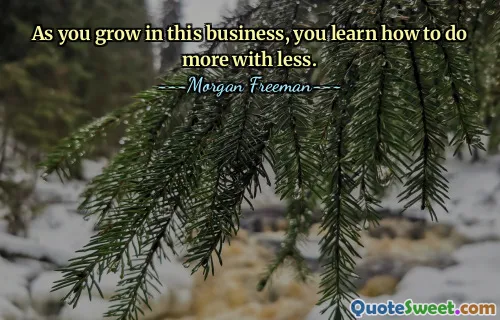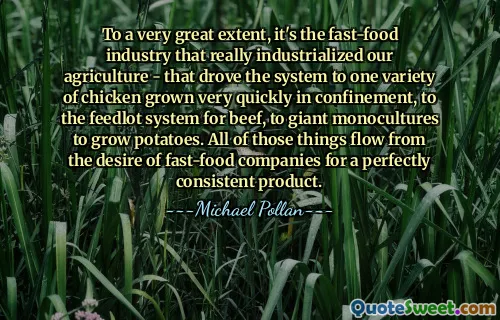
To a very great extent, it's the fast-food industry that really industrialized our agriculture - that drove the system to one variety of chicken grown very quickly in confinement, to the feedlot system for beef, to giant monocultures to grow potatoes. All of those things flow from the desire of fast-food companies for a perfectly consistent product.
Michael Pollan’s quote critically highlights the powerful influence of the fast-food industry on modern agricultural practices. It is a compelling reminder of how consumer demand, especially for uniformity and efficiency, shapes entire food systems. Fast-food giants prioritize a flawless, consistent product to maintain brand identity and consumer expectations, which in turn pressures farmers and producers to adopt industrialized, large-scale methods.
The quote draws attention to several key problems: the confinement and rapid growth of a single breed of chicken, the feedlot system for raising cattle, and expansive monocultures for crops like potatoes. These practices reflect a push toward efficiency and scale but often neglect biodiversity, animal welfare, and ecological sustainability. Pollan implicitly critiques how commercial priorities can drive agricultural homogenization, which sacrifices environmental health and resilience.
This perspective invites a broader reflection on the relationship between food consumption, production methods, and corporate influence. It encourages consumers to recognize that the convenience and consistency of fast food come with hidden costs, including environmental degradation and ethical concerns. It also suggests that meaningful change would require rethinking how food businesses operate—perhaps valuing diversity, animal welfare, and sustainable practices over sheer uniformity and speed.
Ultimately, Pollan’s insight challenges us to consider how deeply intertwined our food habits are with complex industrial systems and to imagine more responsible food choices that support healthier ecosystems and communities.










